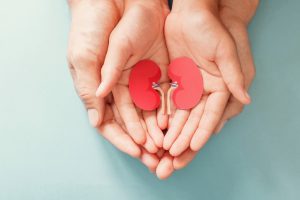March is National Kidney Month and the National Kidney Foundation is urging all Americans to give their kidneys a well-deserved checkup.
The kidneys are two, fist-sized organs in your lower back. They maintain overall health by serving following functions:
- Filtering waste out of 200 liters of blood each day
- Regulating of the body’s salt, potassium and acid content
- Removing toxins from the body.
- Balancing the body’s fluids
- Releasing hormones that regulate blood pressure
- Producing an active form of vitamin D that promotes strong, healthy bones
- Controlling the production of red blood cells
According to the U.S. Centers for Disease and Control, some quick facts on Kidney Disease are:
- Kidney disease is the 9thleading cause of death in the country.
- More than 26 million Americans have kidney disease, and most don’t know it.
- There are over 95,000 people waiting for kidney transplants.
- Currently, more than 590,000 people have kidney failure in the U.S. today.
Often times, kidney failure can be prevented or delayed through early detection and proper treatment of underlying disease such as diabetes and high blood pressure which can slow additional damage to the kidneys.
If you are 18 years or older with diabetes, high blood pressure, cardiovascular disease or a family history of kidney disease, you should schedule an appointment with your doctor and ask that you be screened for kidney disease.
If you would like to make an appointment to have your Kidney’s checked, you can schedule an appointment at Flushing Hospital Medical Center by calling 718-670-5486 for an appointment.
All content of this newsletter is intended for general information purposes only and is not intended or implied to be a substitute for professional medical advice, diagnosis or treatment. Please consult a medical professional before adopting any of the suggestions on this page. You must never disregard professional medical advice or delay seeking medical treatment based upon any content of this newsletter. PROMPTLY CONSULT YOUR PHYSICIAN OR CALL 911 IF YOU BELIEVE YOU HAVE A MEDICAL EMERGENCY.









